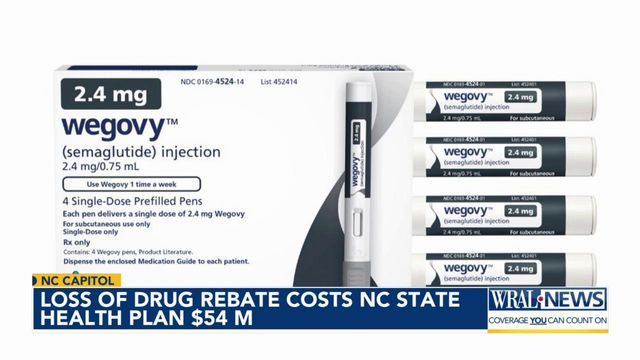Cutting weight-loss drug costs comes at high price for NC health plan
The state health plan stopped covering new prescriptions for weight-loss drugs to save money. That move will cost the state $54 million because of the terms of a drugmaker's contract.
Posted — UpdatedThe board of the North Carolina State Health Plan, which covers more than 700,000 state employees, retirees and their family members, voted in October to drop coverage for new prescriptions of the weight-loss drug Wegovy, citing high costs.
But the decision to cut coverage, which was effective Jan. 1, also caused the state to lose a rebate offered by its pharmacy benefits manager and the drug’s manufacturer — a move that is expected to cost the state $54 million.
Demand for weight-loss drugs has surged in recent years due in part to a surge in advertising and celebrity testimonials. The state health plan covered 5,000 prescriptions for the drugs at the beginning of 2023. By the end of the year, it was 25,000.
“It was only approved in 2022. And by 2023, it's our number-one drug,” said Sam Watts, interim plan director. “It's effective. And there's a friends-and-neighbors kind of component. You hear about it. You see somebody who's lost weight.”
But demand for Wegovy was breaking the bank, Watts said.
In 2023, the state health plan spent about $1 billion on prescriptions across the plan, Watts said. Weight loss drugs accounted for $100 million, or 10% of the total. And that was with a substantial rebate of $540 per $1,349 monthly prescription for Wegovy — a savings of 40%.
“If we had kept covering these, we were going to have to double the premiums that most members of the state health plan have to pay,” Watts said. “We would have to add a surcharge per unit or per family of $48.50 per month, just so that everyone in the state health plan could have access to this one medication.”
He said the plan’s efforts to negotiate limits on coverage — for example, only offering it for people with dangerously high body mass — were rejected by its pharmacy benefits manager, CVS Caremark, and the drug’s manufacturer, Novo Nordisk, which warned the plan would lose its substantial rebate if it took any steps to curb usage.
Watts said under Novo Nordisk’s contract with CVS Caremark, health plans lose their discount if they restrict access to Novo Nordisk’s drugs.
“Anything we proposed that would reduce the number of users or focus on the people who need it the most was rejected,” Watts said. “The answer each time was, we would lose the rebates.”
CVS Caremark says the cost of weight-loss drugs is “simply unsustainable” and that it is negotiating with drug manufacturers on behalf of the state health plan to make the drugs more affordable. “We remain confident in our ability to deliver a solution to the State Health Plan that provides coverage for weight-loss drugs while delivering meaningful discounts,” Phillip Blando, a spokesman for CVS Caremark, said in a statement.
A spokesperson for Novo Nordisk declined to comment.
Watts said the board opted to continue to cover the state plan’s existing 25,000 Wegovy prescriptions at the end of 2023. But the plan will no longer qualify for the 40% rebate, so the cost of those prescriptions will increase by about $54 million in 2024.
Watts says it’s still better than the alternative.
“The board was looking at a [projected] net expenditure of $170 to $190 million next year” for Wegovy alone, Watts explained.
If they had been able to stop covering new prescriptions for Wegovy while keeping the rebates in place for existing prescriptions, he said, that would have lowered their projected annual cost to between $85 million and $100 million.
With the loss of the rebate, Watts said, their revised projected spending for Wegovy in 2024 will bounce back up to $130 to $139 million. “But that is less than the $170 to $190 million that we would have spent otherwise.”
“And that is a great part of our frustration with the pharmacy benefit manager and the manufacturer,” he added.
Watts said some board members have voiced concern about CVS Caremark’s ability to negotiate the best deals for the plan, but said there is no plan to end the contract with the pharmacy benefits manager.
Watts also stressed that the plan will continue to cover the drugs for diabetes treatment if there’s evidence that the patient is diabetic. Some diabetes drugs, such as Ozempic, have also become known for their weight-loss side effects.
Related Topics
• Credits
Copyright 2024 by Capitol Broadcasting Company. All rights reserved. This material may not be published, broadcast, rewritten or redistributed.





